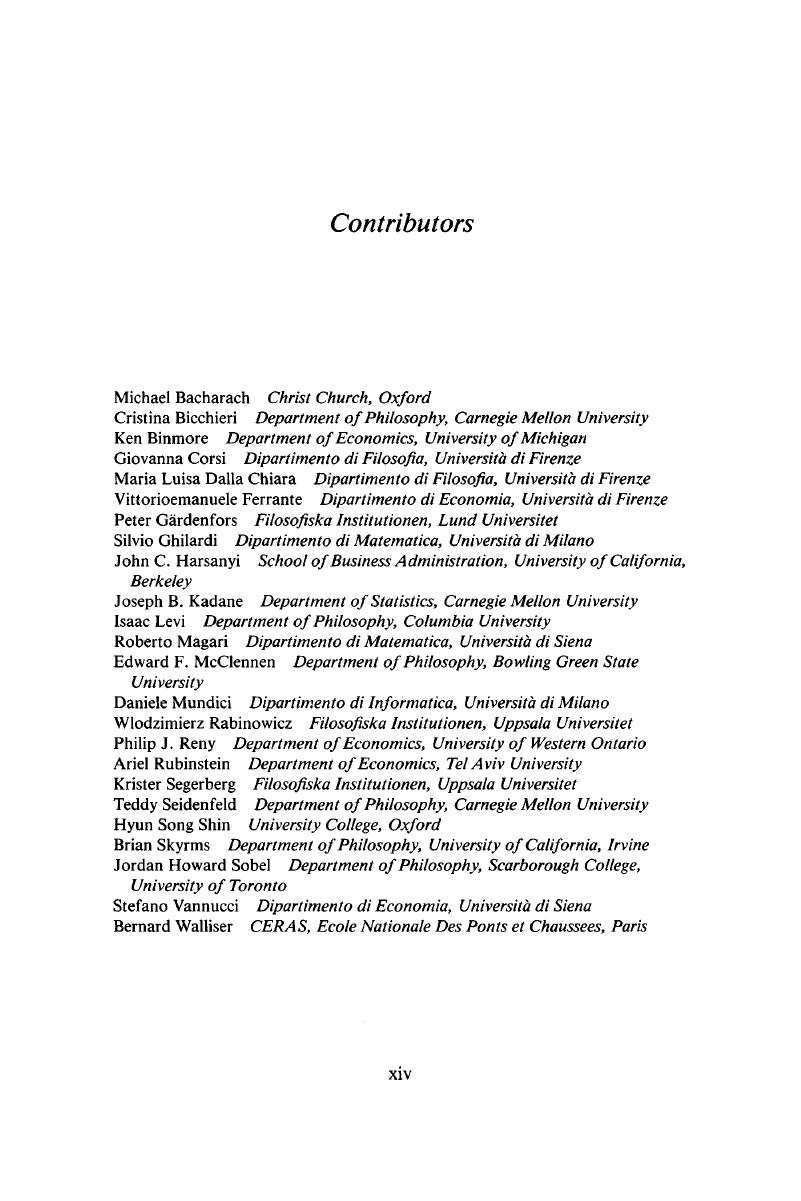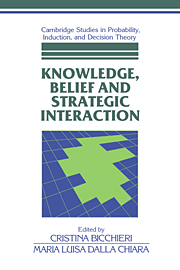Book contents
- Frontmatter
- Contents
- Preface
- List of contributors
- 1 Feasibility
- 2 Elicitation for games
- 3 Equilibrium, common knowledge, and optimal sequential decisions
- 4 Rational choice in the context of ideal games
- 5 Hyperrational games: Concept and resolutions
- 6 Equilibria and the dynamics of rational deliberation
- 7 Tortuous labyrinth: Noncooperative normal-form games between hyperrational players
- 8 On consistency properties of some strongly implementable social choice rules with endogenous agenda formation
- 9 Algorithmic knowledge and game theory
- 10 Possible worlds, counterfactuals, and epistemic operators
- 11 Semantical aspects of quantified modal logic
- 12 Epistemic logic and game theory
- 13 Abstract notions of simultaneous equilibrium and their uses
- 14 Representing facts
- 15 Introduction to metamoral
- 16 The logic of Ulam's games with lies
- 17 The acquisition of common knowledge
- 18 The electronic mail game: Strategic behavior under “almost common knowledge”
- 19 Knowledge-dependent games: Backward induction
- 20 Common knowledge and games with perfect information
- 21 Game solutions and the normal form
- 22 The dynamics of belief systems: Foundations versus coherence theories
- 23 Counterfactuals and a theory of equilibrium in games
List of contributors
Published online by Cambridge University Press: 05 November 2011
- Frontmatter
- Contents
- Preface
- List of contributors
- 1 Feasibility
- 2 Elicitation for games
- 3 Equilibrium, common knowledge, and optimal sequential decisions
- 4 Rational choice in the context of ideal games
- 5 Hyperrational games: Concept and resolutions
- 6 Equilibria and the dynamics of rational deliberation
- 7 Tortuous labyrinth: Noncooperative normal-form games between hyperrational players
- 8 On consistency properties of some strongly implementable social choice rules with endogenous agenda formation
- 9 Algorithmic knowledge and game theory
- 10 Possible worlds, counterfactuals, and epistemic operators
- 11 Semantical aspects of quantified modal logic
- 12 Epistemic logic and game theory
- 13 Abstract notions of simultaneous equilibrium and their uses
- 14 Representing facts
- 15 Introduction to metamoral
- 16 The logic of Ulam's games with lies
- 17 The acquisition of common knowledge
- 18 The electronic mail game: Strategic behavior under “almost common knowledge”
- 19 Knowledge-dependent games: Backward induction
- 20 Common knowledge and games with perfect information
- 21 Game solutions and the normal form
- 22 The dynamics of belief systems: Foundations versus coherence theories
- 23 Counterfactuals and a theory of equilibrium in games
Summary

- Type
- Chapter
- Information
- Publisher: Cambridge University PressPrint publication year: 1992

